UNIFIL says four Ghanaian peacekeepers were injured after a rocket struck their base in the village of Ramyah in Lebanon.
It said the attack was "most likely" conducted by "non-state actors within Lebanon", adding that three of the peacekeepers were taken to hospital in Tyre for treatment.
In total, the organisation said its personnel and facilities were "targeted in three separate incidents in south Lebanon".
In another incident, Italy's defence ministry said eight rockets hit the headquarters of the Italian contingent of UNIFIL in Shama.
No injuries have been reported but five Italian soldiers are being monitored in the base's medical facility, the ministry said in a statement.
The rockets hit some outdoor areas and the base's supply warehouse where no soldiers were present, it said.
A probe is under way to determine where the rockets originated and to identify those responsible, the ministry added.
The Israeli military accused Iran-backed militant group Hezbollah of firing on the two United Nations peacekeeping bases.
Hezbollah fired a "number of rockets" at a UN base in the southern village of Shamma at around 1:30pm (11:30am Irish time), an army statement said.
At 9:50am (07:50am Irish time), a Hezbollah rocket had already hit another UN position in Ramyah, it added.
UNIFIL also said a patrol was "directly fired at" by "an armed person" while passing through a road northeast of the village of Khirbat Silim.
It has launched investigations into each of these incidents.
The mission has also informed the Lebanese armed forces about them.
In a post on X, the Irish Defence Forces said all "Irish personnel are safe and accounted for", adding that "all necessary force protection measures continue to be observed".
The United Nations and several member states have repeatedly called on all parties to ensure the safety of peacekeepers.
The peacekeeping mission is deployed in southern Lebanon to monitor the demarcation line with Israel, an area that has seen more than a year of hostilities between Israeli troops and Hezbollah fighters.
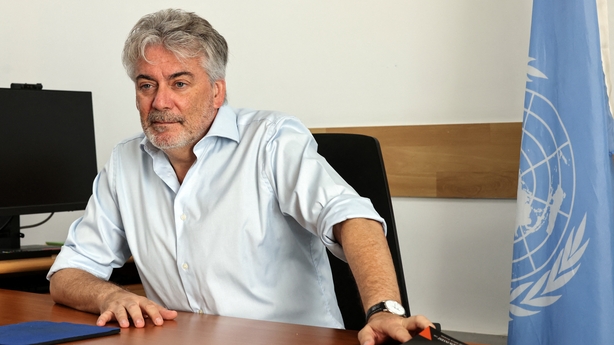
Separately, Argentina has notified the peacekeeping mission of its withdrawal from the force, a UNIFIL spokesperson said.
"Argentina has asked its officers to go back (to Argentina)," UNIFIL spokesperson Andrea Tenenti said in response to a question about a newspaper report.
He declined to comment on the reason for their departure, referring the question to Argentina's government.
Argentina is one of 48 countries contributing peacekeepers to UNIFIL, which includes Ireland.
It has a total of three staff currently in Lebanon, a UN website showed.
It did not immediately respond to Mr Tenenti's comments.
UNIFIL has previously referred to "unacceptable pressures being exerted on the mission through various channels".
Peacekeepers have refused to leave their posts despite more than 20 injuries in the past two months and damage to facilities which UNIFIL blames on the Israeli military.
Israel has denied such incidents are deliberate attacks.
Israel says UN troops provide a human shield for Hezbollah fighters and has told UNIFIL to evacuate from southern Lebanon for its own safety - a request that the force has rejected.
Mr Tenenti said there was no broader indication of declining support for the mission.
"The idea is to stay. So there is no discussion of withdrawing at all," he said.
Israel's military did not immediately comment on Mr Tenenti's remarks.
'Silent normalisation of horror' - UNICEF
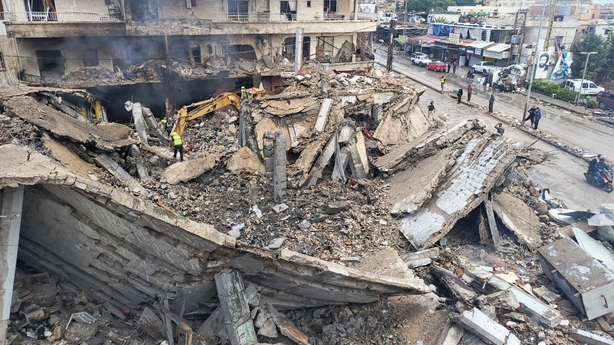
Meanwhile more than 200 children have been killed and 1,100 injured in Lebanon in the past two months, the UN children's agency UNICEF said.
The more than year-old conflict in Lebanon turned into all-out war in late September when Israel launched a major offensive against Hezbollah.
"Despite more than 200 children killed in Lebanon in less than two months, a disconcerting pattern has emerged: their deaths are met with inertia from those able to stop this violence," UNICEF spokesperson James Elder told a Geneva press briefing.
"For the children of Lebanon, it has become a silent normalisation of horror," he added.
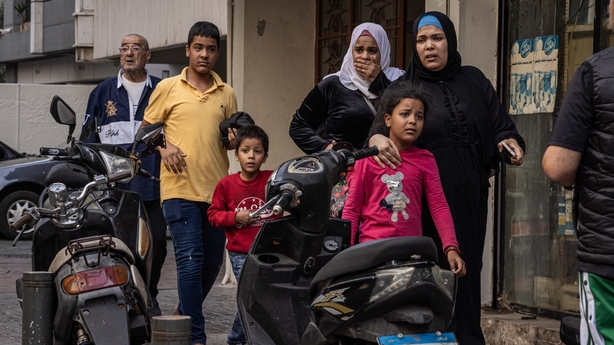
He declined to comment on who was responsible for the killings, saying that it was clear to anyone who follows the media.
Mr Elder said there were "chilling similarities" between the conflicts in Lebanon and in Gaza, where a significant portion of the more than 43,000 people killed in the 13-month-old war between Israel and Hamas are reported to be children.
UNICEF is providing psychosocial support to children and providing medical supplies, meals and sleeping kits to the hundreds of thousands of children who have fled the fighting.
"In Lebanon, much the same as has become the case in Gaza, the intolerable is quietly transforming into the acceptable," he added.
End to war 'within our grasp' - US envoy
US special envoy Amos Hochstein said during a visit to Beirut that an end to the Israel-Hezbollah war was "now within our grasp" as he met with officials to discuss a truce plan largely endorsed by Lebanon.
The United States and France have spearheaded efforts for a ceasefire in the war.
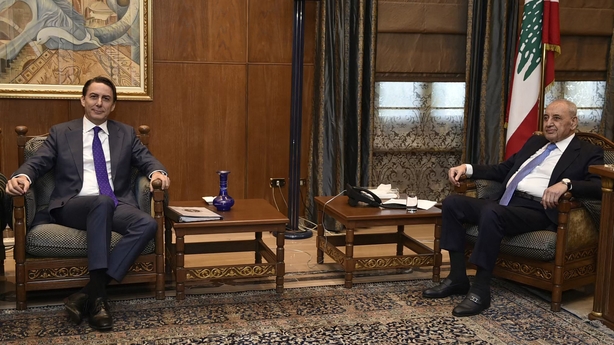
Israel expanded the focus of its operations from Gaza to Lebanon, vowing to secure its northern border to allow tens of thousands of people displaced by the cross-border fire to return home.
Since the clashes began with Hezbollah's attacks on Israel, more than 3,510 people in Lebanon have been killed, according to authorities there.
Following a meeting with Hezbollah-allied parliamentary speaker Nabih Berri, who has led mediation on behalf of the group, Mr Hochstein told reporters he saw "a real opportunity" to end the fighting.
The head of Lebanon's Hezbollah group, Naim Qassem, has postponed a speech to a later time, Hezbollah's media office said.
Qatar has said that Hamas negotiators are not in Doha but the Palestinian militant group's office there has not been permanently closed.
Earlier, Israel launched airstrikes on central Beirut, killing five people according to the health ministry, as firefighters said a rocket launched from Lebanon killed one woman in Israel.
The Israeli army also said that a soldier was killed in south Lebanon.
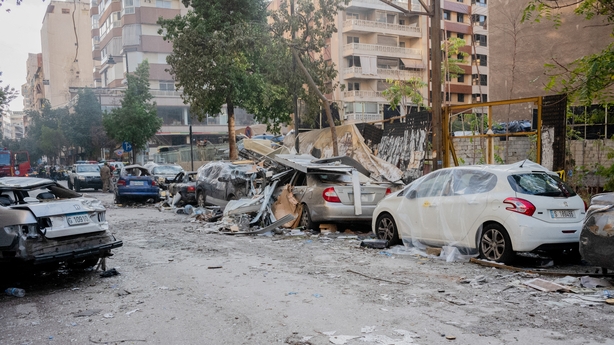
Israel has staged three strikes in two days against central Beirut, after weeks of air raids aimed at emptying the southern suburbs stronghold of the Iran-backed Hezbollah group.
Lebanon's health ministry said five people were killed and 31 wounded in an Israeli strike in Zuqaq al-Blat. Many people have fled to the densely populated district from southern Beirut.
The official National News Agency (NNA) said an apartment near a Shia Muslim place of worship had been targeted, "causing great damage".
Israel's military said Hezbollah fired around 100 projectiles into northern Israel, with some intercepted by air defences.
In Shfaram, east of the Haifa area where Hezbollah has regularly claimed attacks, a rocket hit a building and killed a woman, emergency personnel said.
The building "suffered a direct hit" and ten people were mildly wounded, paramedics said.
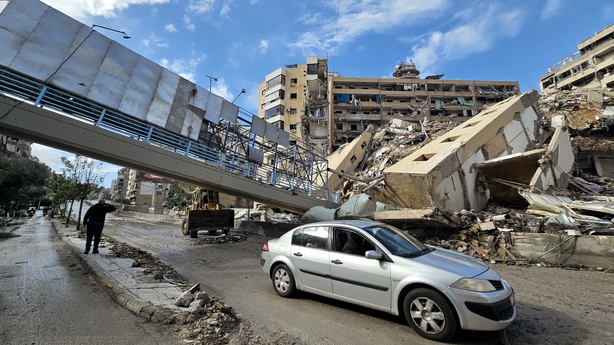
In the suburbs of Israel's commercial capital Tel Aviv, five people were wounded, including one woman in serious condition, after rocket fire hit central Israel, first responders said.
Hezbollah said it had launched "attack drones" against "sensitive military points in the city of Tel Aviv".
In Beirut, Israel's strikes prompted the closure of schools and higher education institutions in the Beirut area for two days.

